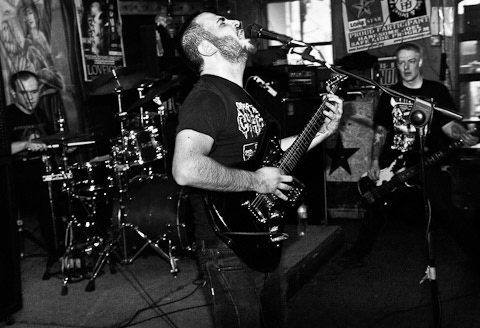
BRASH CALLING With roots in Boston, Castevet revamp and subvert the black-metal form with
remarkable musicianship and progressive songwriting. |
Castevet's jaggedly angular extreme metal, defined by taut, insistent buildups, abrupt changes, deft use of dynamics, unsettling melodies, and energetic, intricate drum fills, has spellbound listeners since late 2006. The group's founders, guitarist/vocalist Andrew Hock and drummer Ian Jacyszyn, share extensive extreme-metal pedigrees. Jacyszyn plays in brutal death-metal act Copremesis and other outfits; Hock, currently active in ensembles like Baltimore/New York trio Feast of the Epiphany, cut his teeth in cult favorite Biolich as a teenager and formerly performed with avant-garde death-metalers Ehnahre while attending New England Conservatory and splitting his time between Boston and New York.
Castevet revamp and subvert the extremes of the black metal form with remarkable musicianship and progressive songwriting, but Hock is quick with caution. "Castevet was never meant to be black metal, although aspects of that music appear in our sound, as black metal is very close to all of us," he says. Perfectionists and meticulous songwriters, the band fomented its approach for the better part of three years before issuing its first 7-inch, 2009's Stones/Salts, then unleashed its seething debut album, Mounds of Ash — the product of four years' painstaking and obsessive revision — the following year. The record debuted on Profound Lore, a label with significant currency and a knack for presenting bands that relish irregularity while respecting tradition. The album fared well among indie critics and was featured on several best-of lists from respected metal magazines, echoing Castevet's wide-ranging appeal among diehards, outsiders, and skeptics. The LP's international acclaim allowed for a headlining tour of Canada and a set at this year's Maryland Deathfest, a milestone for the band.
 |
Having parted ways with two previous bassists, Castevet recently welcomed Krallice's Nick McMaster, who has seen success with several bands and one-off supergroups. "Working with Nick has been very helpful, and we have total trust in his abilities as a composer and player," Hock says. "Adding a third compositional voice means the bass lines offer more harmonic, rhythmic, and melodic counterpoint than found in previous material, a really great step forward for us. Given our labor-intensive writing and editing process, having a third party who is more actively involved has been a welcome change."
Castevet previewed a new song at Somerville's Radio in late March that, while retaining the group's eccentricity through unusual chord voicings and polyrhythmic drumming, showcased an oblique nod to the mid-tempo breakdown common in black metal. Pressed on this observation, Hock offers, "We've never made any conscious decisions to sound more like this or that. We've always tried to let the music and our compositional goals dictate their own aesthetic. . . . It is important to me to create heavy music that isn't bound to the ethos of any sub-genre and to let our influences be fully synthesized in a way that is natural, fluid, and subtle."